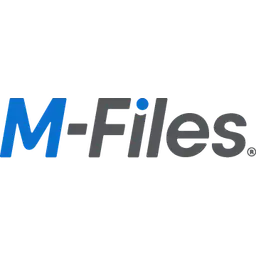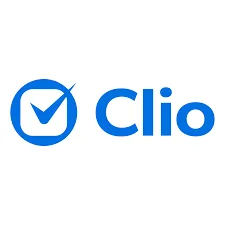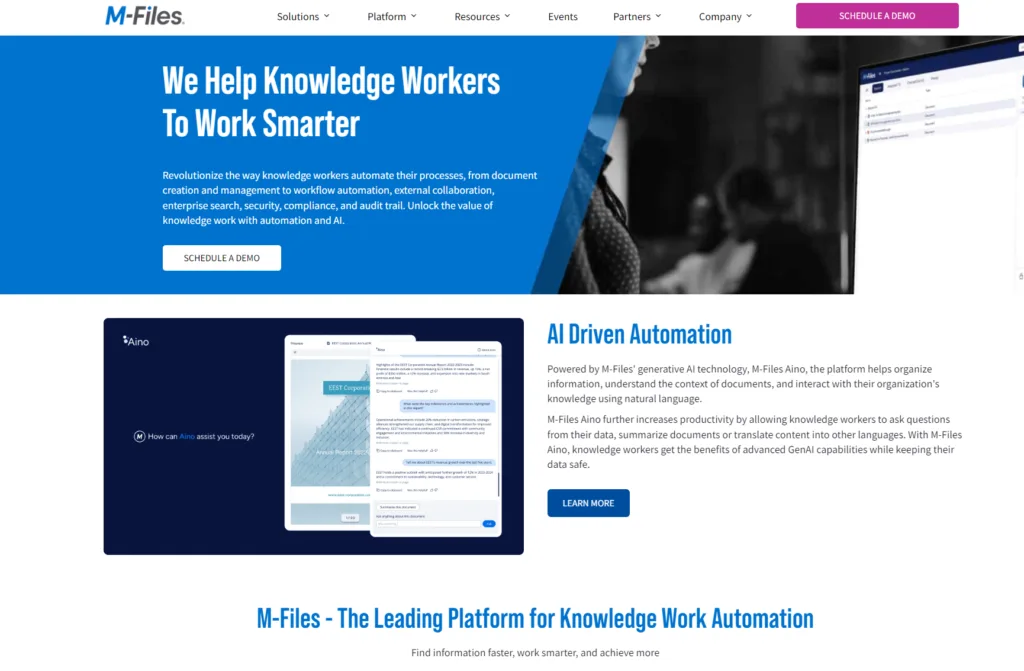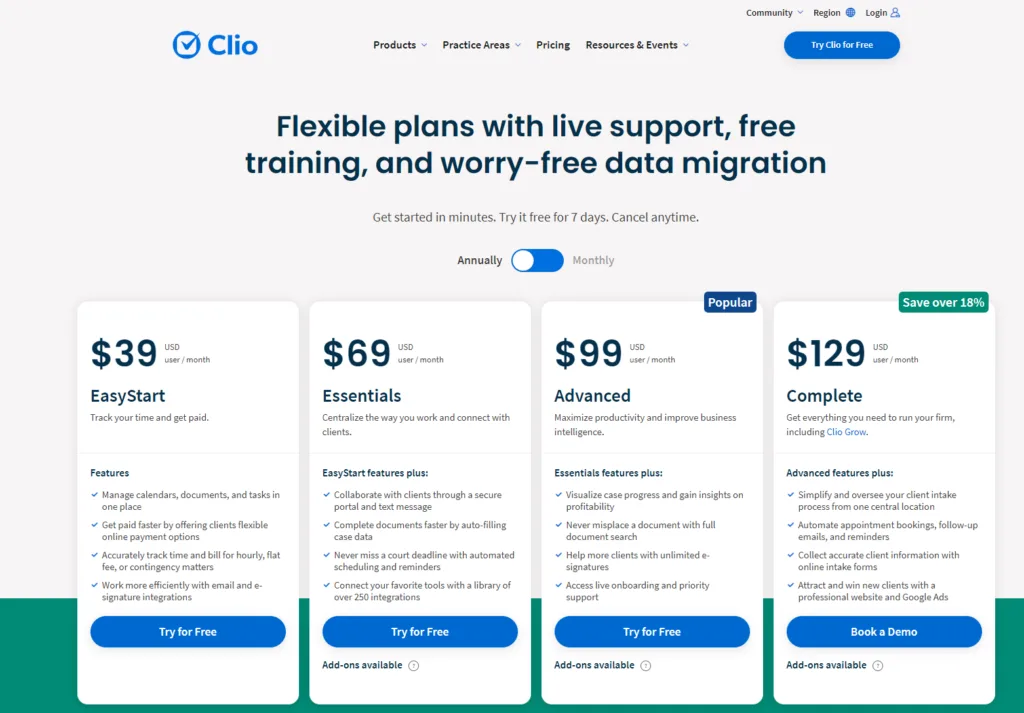Choosing the right document management tool is crucial in a world where the difference between organized files and chaotic digital clutter can determine the success of your business operations. On one side of the ring, we have M-Files, a heavyweight contender known for its robust, metadata-driven approach that promises to transform how businesses manage their documents. On the other, Clio steps in with agility, specifically designed for legal professionals, offering a specialized suite of tools that go beyond document management to encompass practice management and client relations. But when the dust settles, which of these tools will be the best fit for your needs?
M-Files | Clio |
|---|---|
| G2 Score – 4.3 out of 5 stars | G2 Score – 4.6 out of 5 stars |
| TrustRadius Score – 9.2/10 | TrustRadius Score – 7/10 |
Integration Capabilities: The Digital Symphony
The ability of a document management system (DMS) to seamlessly integrate with existing applications and software solutions significantly amplifies its value, enhancing productivity and operational efficiency across the board.
M-Files: The Seamless Integrator
M-Files shines with its capability to integrate deeply into a business’s existing digital infrastructure. From CRM and ERP systems to email and various cloud storage solutions, M-Files ensures a cohesive flow of information across platforms. This integration prowess is powered by a sophisticated API and a flexible architecture, enabling businesses to tailor the DMS to their specific workflows and system requirements. The result is a seamless user experience where document management becomes a natural part of the daily workflow, rather than a disjointed task.
Beyond its broad compatibility, M-Files offers extensive customization options, allowing businesses to mold the system according to their unique operational needs. This level of adaptability ensures that as your business evolves, M-Files can adapt, providing consistent value and support regardless of the changing digital landscape.
Clio: The Legal Tech Maestro
Clio’s strength lies in its specialized focus on the legal industry, offering integrations that are specifically beneficial for law practices. It connects effortlessly with tools commonly used in the legal field, such as legal research platforms, accounting software, and communication tools, enhancing the practice management aspect of law. Clio’s integrations are designed to streamline legal workflows, from client intake to billing, ensuring that document management is just one part of a holistic solution for legal professionals.
While Clio might not offer the wide-ranging integration capabilities of a platform like M-Files, its focused approach ensures that every integration adds significant value to legal practices. This specialization makes Clio an invaluable tool for law firms looking for a DMS that understands and caters to the nuances of legal work.
Security and Compliance: The Pillars of Trust in Document Management
In today’s world, where data breaches are a constant threat and regulatory demands are ever-tightening, the capability of a DMS to secure sensitive information and ensure adherence to compliance standards is paramount for any organization’s integrity and operational viability. The effectiveness of a DMS’s security features and its capacity to meet compliance requirements can greatly influence an organization’s risk management strategy and its ability to safeguard client and business data.
M-Files: Robust Security Meets Comprehensive Compliance
M-Files takes a rigorous approach to data security, utilizing advanced encryption for data at rest and in transit. Its dynamic permissions model allows for granular control over document access, ensuring sensitive information is only viewable by authorized personnel. Furthermore, M-Files’ ability to provide detailed audit trails offers invaluable insights into document interactions, bolstering security and accountability.
Excelling in regulatory compliance, M-Files is designed to support adherence to a broad spectrum of standards, including GDPR, HIPAA, and ISO. The platform automates critical compliance processes, such as retention policies and electronic signatures, significantly reducing the risk of non-compliance penalties. M-Files’ comprehensive approach to compliance makes it a strong ally for organizations navigating complex regulatory landscapes.
Clio: Tailored Security for Legal Professionals
Clio understands the paramount importance of security in the legal sector, offering robust protections tailored to the specific needs of law practices. It employs state-of-the-art encryption and secure data hosting to protect client information and case documents. Access controls and permissions in Clio are designed with legal workflows in mind, ensuring that sensitive data is safeguarded throughout the case lifecycle.
Recognizing the stringent compliance requirements faced by legal professionals, Clio incorporates features that assist law firms in meeting their ethical and regulatory obligations. This includes secure client communication channels and document storage solutions that comply with legal standards, making it easier for firms to maintain client confidentiality and adhere to data protection laws.

Related: Check out our free SEO suite

Collaboration and Document Sharing: Facilitating Effective Teamwork
In today’s interconnected work environment, the ability of a document management system (DMS) to facilitate seamless collaboration among team members and secure sharing of documents with external parties is essential for streamlining workflows and driving project success. The capacity of a DMS to support easy collaboration and secure document sharing can significantly influence a team’s ability to work efficiently and cohesively.
M-Files: Advanced Collaboration within a Structured Environment
M-Files offers a suite of advanced collaboration tools designed to enhance productivity and ensure document integrity. Its check-out/check-in system prevents overlapping edits, while version control maintains a clear history of document changes. M-Files enhances teamwork by allowing users to easily share documents and collaborate on them in real-time, supported by notifications and assignments that keep projects moving forward.
With M-Files, sharing documents externally is secure and straightforward, thanks to configurable permissions and secure link sharing. The platform ensures that businesses can collaborate with clients and partners without compromising the security of sensitive information, a key advantage for organizations that frequently share critical documents outside their internal network.
Clio: Streamlined Collaboration for Legal Professionals
Clio is tailored to meet the specific needs of the legal industry, and this focus extends to its collaboration features. It provides a centralized platform where legal teams can work together on cases, share notes, and manage tasks efficiently. Clio’s document management capabilities are integrated with its case management system, facilitating seamless collaboration on documents directly linked to client cases.
Recognizing the importance of confidentiality in legal work, Clio offers secure document sharing capabilities that allow firms to share case files and documents with clients and other stakeholders safely. The platform provides controlled access to documents, ensuring that sensitive information remains protected, while still facilitating easy client collaboration and review.
Mobile Accessibility and Remote Work Support: Empowering a Distributed Workforce
With the rise of distributed teams and the necessity for on-the-go document access, a document management system’s (DMS) ability to provide robust mobile support and cater to remote work environments is a pivotal factor in ensuring uninterrupted productivity and operational flexibility. The effectiveness of a DMS in supporting mobile users and facilitating remote work can significantly impact an organization’s adaptability and employee satisfaction.
M-Files: Comprehensive Mobile Functionality
M-Files offers a fully-featured mobile application that extends the core functionalities of its DMS to smartphones and tablets. This app allows users to access, manage, and share documents from anywhere, mirroring the desktop experience with the added benefit of mobile convenience. The M-Files mobile app supports offline access, ensuring that users can continue to work even without an internet connection.
Beyond mobile access, M-Files excels in accommodating remote work scenarios through its cloud-based platform, enabling seamless collaboration across distributed teams. The system’s robust security features are extended to mobile and remote environments, ensuring that data integrity and compliance are maintained outside the traditional office setting.
Clio: Optimized for Legal Professionals on the Move
Understanding the dynamic nature of legal work, Clio provides a mobile app designed to meet the needs of legal professionals working remotely or in court. The app includes functionalities essential for managing cases, tracking time, and accessing documents related to client work, ensuring that lawyers can stay productive and responsive regardless of their location.
Clio’s cloud-based infrastructure is inherently suited for remote work, offering a centralized platform for case and document management that is accessible from anywhere. This facilitates not just individual productivity but also collaborative efforts among team members, who can share information and updates on cases in real time, fostering a cohesive remote working environment.
User Training and Onboarding: Accelerating Adoption and Proficiency
The structure and availability of training and onboarding resources are key factors in helping new users become proficient with a DMS, directly impacting the system’s effectiveness and the productivity of your team.
M-Files: Comprehensive Learning Paths
M-Files understands the importance of effective user training and offers a variety of resources designed to facilitate smooth onboarding and continuous learning. From detailed documentation and online tutorials to webinars and customized training sessions, M-Files provides users with multiple avenues to gain expertise in using the platform. This comprehensive approach ensures that users can quickly become comfortable with the system, regardless of their technical proficiency.
Beyond initial onboarding, M-Files places a strong emphasis on supporting ongoing education. It offers advanced training modules and resources that help users explore the more sophisticated features of the system, enabling businesses to leverage the full power of the DMS as their familiarity grows.
Clio: Tailored Training for Legal Professionals
Recognizing the specific needs of the legal industry, Clio offers targeted training and onboarding resources that are specially designed for law firms and legal departments. Its onboarding process includes access to a dedicated account manager, live training sessions, and an extensive online resource center. Clio’s approach is tailored to ensure that legal professionals can quickly adapt to using the platform, focusing on the features most relevant to their daily workflows.
In addition to standard training resources, Clio leverages its position in the legal tech community to offer ongoing learning opportunities through webinars, user conferences, and participation in legal industry events. These community-driven learning experiences provide valuable insights into optimizing legal practice management and document management within Clio.
Pricing
M-Files:

Clio:

Conclusion
In concluding our comprehensive comparison between M-Files and Clio, we’ve traversed through essential aspects that dictate the success and efficiency of a document management system (DMS) in any organization. Both platforms demonstrate distinct strengths tailored to meet diverse business needs and operational demands.
M-Files emerges as a robust, highly customizable solution designed for organizations seeking an advanced DMS with strong integration capabilities, comprehensive security, and compliance features. Its emphasis on a metadata-driven approach offers unparalleled organization and retrieval efficiency, making it an ideal choice for businesses with complex document management requirements across various industries. The extensive training and onboarding resources provided by M-Files ensure that users can maximize the platform’s capabilities, enhancing overall productivity and document control.
Clio, on the other hand, stands out as a specialized DMS tailored for the legal industry, integrating document management with practice management tools to offer a holistic solution for law firms and legal departments. Clio’s focus on legal workflows, combined with its secure, user-friendly platform, supports effective collaboration and client engagement. Tailored training and onboarding resources, along with a strong legal community presence, ensure that legal professionals can quickly leverage Clio to streamline their operations and focus on delivering exceptional legal services.
Read Next:
- AWeber vs EmailOctopus: The Best Email Marketing Tool
- ActiveCampaign vs eSputnik: The Best Email Marketing Tool for 2024
- ActiveCampaign vs MailUp: The Best Email Marketing Tool for 2024
- AWeber vs Campaigner: The Best Email Marketing Tool
- ConvertKit vs MailerLite: The Best Email Marketing Tool for 2024






















Comments are closed.